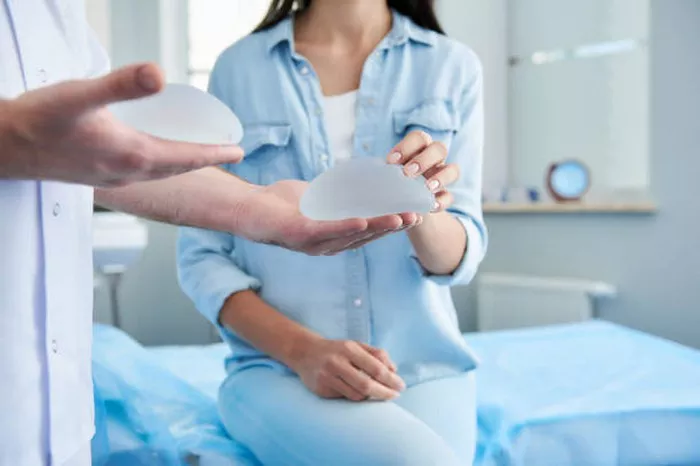Silicone breast implants (SBIs) are widely used in breast reconstruction and cosmetic surgery, but long-term complications such as rupture and infection can present serious risks. This case report describes a 43-year-old Japanese woman who developed an SBI rupture and skin ulceration following a COVID-19 infection. The infection led to immunosuppression, which allowed a secondary bacterial infection to take hold, eventually requiring the removal of the implant. This case highlights the potential complications of long-term SBI use and underscores the importance of vigilant postoperative monitoring.
Introduction
Silicone breast implants are commonly used in breast reconstruction after mastectomy or for cosmetic purposes. Although SBIs are generally considered safe, complications such as implant rupture, capsular contracture, and foreign body granulomas can occur. The long-term risks associated with SBIs may be further exacerbated by systemic conditions like infection. In recent years, additional complications have been reported, including breast implant-associated anaplastic large cell lymphoma (BIA-ALCL), emphasizing the need for careful evaluation and monitoring through imaging.
Since the emergence of the coronavirus disease 2019 (COVID-19) pandemic in early 2020, the virus has presented a range of health challenges, including post-infection complications such as skin ulcerations and other dermatological manifestations. While there have been reports of COVID-19 affecting SBIs, no direct association has been conclusively established. This case report describes a woman whose pre-existing SBI was compromised by a COVID-19 infection, leading to ulceration and eventual surgical intervention.
Case Presentation
A 43-year-old woman presented to the hospital with complaints of serous nipple discharge in her right breast. Three years prior, she had been diagnosed with psychiatric issues but had no family history of breast cancer or significant health concerns. Routine breast cancer screening showed no malignant lesions. However, she had a history of bilateral mammoplasty with silicone breast implants performed 20 years ago for cosmetic purposes.
Ultrasonography (US) of her right breast revealed separation between the implant capsule and shell, with mild waviness but no increase in echo density within the capsule. The left breast exhibited similar deformities, with slight increases in subcapsular density, suggesting minor damage to the implants. Despite these findings, the patient opted for removal of the implants at her own expense but had not yet consulted a plastic surgeon due to personal reasons.
During the COVID-19 pandemic, the patient contracted the virus, with a positive COVID-19 antigen test confirming the infection. She experienced mild upper respiratory symptoms, fever, and localized redness under her left breast. Over time, the redness expanded and became increasingly painful. The skin began to break down, and persistent bleeding and discharge followed. Three months after the initial infection, the patient returned to the hospital with new symptoms.
Clinical Findings
Upon examination, the patient’s upper respiratory symptoms had resolved, and no additional signs of immune abnormalities were present. However, a skin ulcer had formed on the inferomedial side of the left breast, exposing the silicone implant. Bacterial cultures taken from the ulceration revealed the presence of Staphylococcus aureus, a common pathogen associated with infections in surgical wounds and foreign body implants.
Laboratory tests indicated a mild increase in white blood cell count (9.6 × 10³/μL), with a neutrophil percentage of 71.8%. The platelet count was slightly elevated at 39.5 × 10³/μL, and C-reactive protein levels were elevated at 2.3 mg/L, suggesting an ongoing inflammatory response. Other tests, including blood glucose and glycosylated hemoglobin, were within normal ranges, and the antinuclear antibody test was negative, ruling out autoimmune disorders. The soluble interleukin-2 receptor was measured at 234 U/mL, which was within the normal range.
Discussion
This case illustrates a potential complication in patients with silicone breast implants, where an infection exacerbated by COVID-19 resulted in SBI rupture and skin ulceration. The patient’s immune system was likely weakened due to the viral infection, making her more susceptible to a secondary bacterial infection that led to significant tissue damage.
The rupture and subsequent infection of silicone breast implants are rare but known risks. In this case, the infection likely facilitated the implant’s rupture by causing inflammation in the surrounding tissue. The development of skin ulceration exposed the implant, creating a direct pathway for bacterial contamination, which worsened the condition.
Conclusion
This case report highlights the importance of monitoring patients with silicone breast implants for complications, especially in the context of systemic infections like COVID-19. Long-term use of SBIs requires careful attention to signs of rupture, capsular contracture, or infection. Patients should be aware of the risks associated with breast implants and consider early intervention when complications arise. Further studies are necessary to better understand the interaction between systemic conditions such as viral infections and the integrity of breast implants, particularly in the context of immune system suppression.
You Might Be Interested In:
- Woman Awarded £250,000 in Damages Over Ruptured Breast Implants
- Ultrasound vs. MRI for Evaluating Silicone Leakage from Breast Implants
- Can Breast Implants Cause Eczema?


